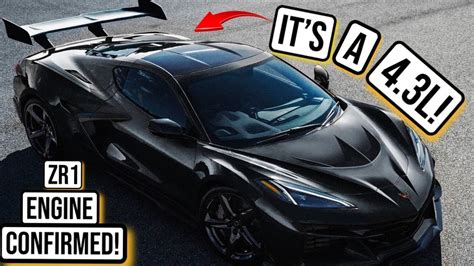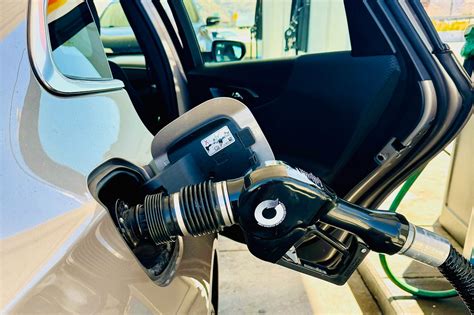
Chevy’s highly anticipated C8 Corvette ZR1 is facing scrutiny as performance claims appear to fall short of expectations, prompting questions about potential exaggeration of its capabilities. Internal documents and sources suggest the vehicle’s development faced significant hurdles, impacting its promised performance metrics and raising concerns about the accuracy of initial projections.
General Motors’ Chevy division is under fire following revelations that the performance figures for the upcoming C8 Corvette ZR1 may have been overstated. Reports indicate that the vehicle, which is expected to be a high-performance variant of the mid-engine Corvette, encountered substantial developmental challenges that ultimately affected its performance output. These revelations stem from leaked internal documents and corroborated by insiders familiar with the ZR1’s development process, casting a shadow over the highly anticipated sports car.
The core of the issue revolves around the ZR1’s LT7 engine, a twin-turbocharged V8 designed to deliver a significant power boost over the standard Corvette models. Initial projections suggested the LT7 would produce horsepower figures that would firmly position the ZR1 as a top-tier performer in its class. However, sources now suggest that the engine’s actual output may not reach these original targets due to various engineering and production obstacles. These challenges reportedly involved issues with the engine’s cooling system, turbocharger integration, and overall reliability under sustained high-performance conditions.
“The original targets were ambitious, and while the team made considerable efforts, the final product may not fully align with initial expectations,” an anonymous source familiar with the ZR1’s development stated. This sentiment is echoed in internal communications that suggest a discrepancy between the projected and actual performance metrics, leading to questions about the transparency of Chevy’s marketing and promotional materials.
The discrepancy between promised and actual performance raises serious concerns about potential misrepresentation. Consumers and automotive enthusiasts alike have high expectations for the ZR1, given its historical significance as the ultimate performance Corvette. Overstating the car’s capabilities could not only damage Chevy’s reputation but also lead to legal and consumer backlash if the vehicle fails to deliver on its advertised promises. The potential financial impact on General Motors could be significant, especially if widespread dissatisfaction prompts returns or lawsuits.
Critics argue that Chevy’s handling of the ZR1’s performance claims reflects a broader trend in the automotive industry, where manufacturers sometimes overhype their products to generate excitement and sales. However, such practices can erode consumer trust and ultimately undermine the brand’s credibility.
The ramifications of this situation extend beyond the ZR1 itself, potentially affecting the entire Corvette lineup. The Corvette is an iconic American sports car, and its reputation for performance and innovation is crucial to Chevy’s brand image. Any perceived failure to meet expectations with the ZR1 could tarnish the Corvette’s legacy and impact sales of other models.
Furthermore, the controversy surrounding the ZR1 could have implications for Chevy’s future product development strategies. The company may need to re-evaluate its approach to setting performance targets and ensuring that its marketing claims are realistic and verifiable. This incident could also lead to increased scrutiny from regulatory agencies and consumer advocacy groups, potentially resulting in stricter oversight of automotive advertising practices.
The issues surrounding the C8 Corvette ZR1 are multifaceted, involving technical challenges, marketing considerations, and potential legal ramifications. As the situation unfolds, it will be crucial to monitor how Chevy addresses these concerns and whether the company takes steps to rectify any discrepancies between its performance claims and the vehicle’s actual capabilities. The outcome of this controversy could have a lasting impact on Chevy’s reputation and the future of the Corvette brand.
Detailed Breakdown of the Issues:
The challenges plaguing the C8 Corvette ZR1 extend beyond simple performance metrics, delving into the intricate engineering and production processes that define a high-performance vehicle. Several key factors have contributed to the current controversy:
-
LT7 Engine Development Hurdles: The heart of the ZR1, the LT7 engine, was designed to be a significant upgrade over the standard Corvette’s power plant. The twin-turbocharged V8 was intended to deliver substantial horsepower and torque gains, providing the ZR1 with the performance credentials expected of a top-tier sports car. However, the development process encountered numerous obstacles.
-
Cooling System Inadequacies: One of the primary challenges involved the engine’s cooling system. The increased power output of the LT7 generated more heat, requiring a more robust cooling system to prevent overheating and maintain consistent performance. Initial designs struggled to effectively manage the thermal load, leading to concerns about the engine’s reliability under sustained high-performance conditions.
-
Turbocharger Integration Issues: Integrating the turbochargers into the LT7 engine also proved to be a complex task. The turbochargers needed to be precisely calibrated to deliver optimal performance without compromising engine durability. Issues arose with turbo lag, boost control, and overall engine responsiveness. These problems required extensive testing and modifications to achieve the desired balance of power and reliability.
-
Engine Reliability Concerns: Ensuring the engine’s long-term reliability was another major concern. The increased stress on the engine components due to the higher power output raised questions about the engine’s ability to withstand prolonged use under demanding conditions. Addressing these concerns required strengthening critical engine parts and implementing advanced monitoring systems to detect and mitigate potential problems.
-
-
Performance Metric Discrepancies: The internal documents and insider reports suggest a significant discrepancy between the ZR1’s projected performance figures and its actual capabilities. Initial projections indicated that the ZR1 would achieve certain horsepower, torque, and acceleration numbers that would position it as a leader in its class. However, the actual performance metrics may fall short of these targets.
-
Horsepower and Torque Deficit: Sources indicate that the LT7 engine may not be producing the initially projected horsepower and torque figures. This deficit could impact the ZR1’s overall performance, affecting its acceleration, top speed, and overall driving experience.
-
Acceleration and Top Speed Limitations: The ZR1’s acceleration and top speed may also be affected by the engine’s performance limitations. If the engine is not delivering the expected power, the car may not be able to achieve the acceleration times and top speed figures that were initially advertised.
-
-
Transparency and Marketing Concerns: The discrepancy between the ZR1’s projected and actual performance raises concerns about the transparency of Chevy’s marketing and promotional materials. Critics argue that Chevy may have overstated the car’s capabilities to generate excitement and sales, potentially misleading consumers.
-
Potential Misrepresentation: If Chevy knowingly exaggerated the ZR1’s performance figures, it could face accusations of misrepresentation and false advertising. This could lead to legal challenges and damage the company’s reputation.
-
Erosion of Consumer Trust: Overstating a product’s capabilities can erode consumer trust and undermine the brand’s credibility. Consumers expect manufacturers to be honest and transparent about their products’ performance, and any perceived dishonesty can have long-lasting negative effects.
-
Impact on General Motors and the Corvette Brand:
The controversy surrounding the C8 Corvette ZR1 has significant implications for General Motors and the Corvette brand. The potential financial, legal, and reputational consequences could be substantial.
-
Financial Ramifications: The ZR1 controversy could have a significant financial impact on General Motors. If the company is forced to offer refunds, repair vehicles, or settle lawsuits, the costs could be substantial. Additionally, the negative publicity surrounding the ZR1 could impact sales of other Corvette models and potentially other Chevy vehicles.
-
Legal Challenges: If consumers feel that they have been misled by Chevy’s marketing claims, they may file lawsuits against the company. These lawsuits could allege false advertising, misrepresentation, and breach of warranty. Defending against these lawsuits could be costly and time-consuming, and an unfavorable outcome could result in significant financial penalties.
-
Reputational Damage: The ZR1 controversy could damage Chevy’s reputation and undermine consumer trust. The Corvette is an iconic American sports car, and its reputation for performance and innovation is crucial to Chevy’s brand image. Any perceived failure to meet expectations with the ZR1 could tarnish the Corvette’s legacy and impact sales of other models.
Chevy’s Response and Potential Solutions:
As the controversy surrounding the C8 Corvette ZR1 unfolds, it will be crucial to monitor how Chevy responds to these concerns and whether the company takes steps to rectify any discrepancies between its performance claims and the vehicle’s actual capabilities. Several potential solutions could be considered:
-
Transparency and Communication: Chevy should be transparent and forthcoming about the ZR1’s performance capabilities. The company should provide accurate and verifiable data to support its claims and address any concerns raised by consumers and critics.
-
Performance Enhancements: Chevy could explore potential performance enhancements to address the ZR1’s shortcomings. This could involve further refining the LT7 engine, improving the cooling system, or making other modifications to boost the car’s performance.
-
Compensation and Remediation: If the ZR1’s performance does not meet expectations, Chevy could offer compensation or remediation to affected customers. This could include offering refunds, providing performance upgrades, or extending warranties.
-
Re-evaluation of Marketing Strategies: Chevy may need to re-evaluate its marketing strategies to ensure that its claims are realistic and verifiable. The company should avoid overstating its products’ capabilities and focus on providing accurate and transparent information to consumers.
The Broader Automotive Industry Context:
The controversy surrounding the C8 Corvette ZR1 reflects a broader trend in the automotive industry, where manufacturers sometimes overhype their products to generate excitement and sales. However, such practices can erode consumer trust and ultimately undermine the brand’s credibility.
-
Pressure to Innovate: The automotive industry is highly competitive, with manufacturers constantly striving to develop new and innovative products. This pressure to innovate can sometimes lead to overambitious performance targets and marketing claims.
-
Marketing Hype: Marketing plays a crucial role in the automotive industry, with manufacturers spending significant resources to promote their products. Marketing campaigns often focus on highlighting the most impressive features and capabilities of a vehicle, sometimes exaggerating its performance potential.
-
Consumer Expectations: Consumers have high expectations for new vehicles, particularly high-performance models like the Corvette ZR1. Manufacturers must balance the need to meet these expectations with the reality of engineering and production limitations.
Conclusion:
The C8 Corvette ZR1 controversy serves as a reminder of the importance of transparency, accuracy, and ethical marketing practices in the automotive industry. Manufacturers must be honest and forthcoming about their products’ capabilities and avoid overstating their performance potential. Failure to do so can erode consumer trust, damage the brand’s reputation, and lead to legal and financial consequences. The resolution of this situation will be a crucial test of Chevy’s commitment to its customers and the integrity of the Corvette brand. It will also serve as a cautionary tale for other manufacturers, highlighting the risks of overpromising and underdelivering. The automotive world watches with bated breath as Chevy navigates this challenging situation. The future of the ZR1, and perhaps even the Corvette brand’s legacy, hangs in the balance.
Frequently Asked Questions (FAQs):
-
What is the main issue with the Chevy C8 Corvette ZR1?
The main issue is that the performance claims made by Chevy for the upcoming C8 Corvette ZR1 may be exaggerated. Internal documents and sources suggest the car’s LT7 engine is not performing up to initial projections, leading to concerns about horsepower, acceleration, and overall performance capabilities.
-
What is the LT7 engine, and why is it important to the ZR1?
The LT7 engine is a twin-turbocharged V8 engine designed specifically for the C8 Corvette ZR1. It is intended to be a significant upgrade over the standard Corvette engines, delivering substantially more horsepower and torque. Its performance is crucial to the ZR1’s overall capabilities and its reputation as a high-performance sports car.
-
What are the potential consequences for Chevy if the ZR1’s performance claims are found to be inaccurate?
The potential consequences include:
- Financial impact: Costs associated with refunds, repairs, and potential lawsuits.
- Legal challenges: Lawsuits alleging false advertising and misrepresentation.
- Reputational damage: Erosion of consumer trust and damage to the Corvette brand’s legacy.
- Decreased Sales: The reduction in sales from the Corvette lineup and other models.
-
What steps could Chevy take to address the concerns about the ZR1’s performance?
Chevy could take several steps, including:
- Being transparent and providing accurate performance data.
- Exploring performance enhancements to improve the ZR1’s capabilities.
- Offering compensation or remediation to affected customers.
- Re-evaluating marketing strategies to ensure realistic and verifiable claims.
-
How does this situation reflect broader trends in the automotive industry?
This situation reflects a trend in the automotive industry where manufacturers sometimes overhype their products to generate excitement and sales. This pressure to innovate and compete can lead to exaggerated performance claims, potentially eroding consumer trust if the products don’t meet expectations.
-
What specific challenges did Chevy face during the development of the ZR1’s LT7 engine?
Challenges included:
- Cooling System Inadequacies: Managing the increased heat generated by the high-performance engine.
- Turbocharger Integration Issues: Calibrating the turbochargers for optimal performance and engine durability.
- Engine Reliability Concerns: Ensuring the engine could withstand prolonged use under demanding conditions.
-
Where did the information about the ZR1’s performance discrepancies come from?
The information came from leaked internal documents and anonymous sources familiar with the ZR1’s development process.
-
What is the historical significance of the ZR1 nameplate for Corvette?
The ZR1 nameplate has historically represented the highest performance variant of the Corvette, symbolizing cutting-edge technology and superior performance. It carries a significant legacy and high expectations among automotive enthusiasts.
-
How could this controversy affect the sales of other Corvette models?
Negative publicity surrounding the ZR1 could tarnish the Corvette’s overall brand image and impact sales of other models in the Corvette lineup, as consumers may lose confidence in the brand’s performance and reliability claims.
-
What role does marketing play in shaping consumer perceptions of the ZR1?
Marketing plays a crucial role in creating excitement and shaping consumer expectations for the ZR1. If the marketing claims are perceived as misleading, it can lead to disappointment and distrust, damaging Chevy’s credibility.
-
What are the potential legal ramifications for Chevy if the ZR1’s performance claims are inaccurate?
Chevy could face lawsuits alleging false advertising, misrepresentation, and breach of warranty. These lawsuits could result in significant financial penalties and damage to the company’s reputation.
-
How might regulatory agencies respond to the controversy surrounding the ZR1?
Regulatory agencies could investigate Chevy’s advertising practices and potentially impose stricter oversight to ensure that future claims are accurate and verifiable. This could lead to more stringent regulations for the automotive industry as a whole.
-
What long-term impact could this situation have on Chevy’s product development strategies?
This incident could prompt Chevy to re-evaluate its approach to setting performance targets and ensuring that its marketing claims are realistic and verifiable. It may also lead to increased emphasis on thorough testing and validation before releasing new models.
-
How does this controversy compare to similar situations in the automotive industry?
This controversy is similar to other instances where automakers have faced scrutiny for overstating the performance capabilities of their vehicles. These situations often result in legal challenges, reputational damage, and increased regulatory oversight.
-
What steps can consumers take if they feel they have been misled by Chevy’s marketing claims about the ZR1?
Consumers can file complaints with consumer protection agencies, seek legal advice, and potentially join class-action lawsuits. They can also demand compensation or remediation from Chevy if the ZR1’s performance does not meet expectations.
-
How does the mid-engine configuration of the C8 Corvette play into the ZR1’s performance expectations?
The mid-engine configuration of the C8 Corvette was expected to enhance handling and performance, contributing to higher expectations for the ZR1. Any failure to meet these expectations is amplified by the innovative design of the C8 platform.
-
What alternative solutions might Chevy consider besides direct performance enhancements?
Besides direct performance enhancements, Chevy might consider offering additional features, improved warranties, or exclusive packages to compensate for any perceived performance shortfall. These could help maintain customer satisfaction even if the ZR1 doesn’t fully meet initial performance targets.
-
How is the automotive media influencing the narrative around the ZR1’s performance claims?
Automotive media outlets play a crucial role in reporting on the ZR1’s performance claims, conducting independent testing, and providing critical analysis. Their coverage can significantly influence public perception and hold Chevy accountable for its marketing statements.
-
What role do suppliers play in ensuring the ZR1 meets its performance targets?
Suppliers of critical components, such as turbochargers and cooling systems, play a vital role in ensuring the ZR1 meets its performance targets. Any shortcomings in these components can directly impact the car’s overall performance and reliability.
-
What data or metrics are most critical in validating the ZR1’s actual performance?
Key metrics include horsepower and torque figures, acceleration times (0-60 mph, quarter-mile), top speed, and track performance data (lap times). Independent testing and validation of these metrics are crucial for confirming the ZR1’s actual performance capabilities.
-
Considering the challenges, is it possible Chevy will delay or cancel the ZR1 altogether?
While unlikely given the investment and anticipation, the severity of the performance issues could lead Chevy to delay the ZR1’s release to address the problems. Complete cancellation is a less probable but still possible scenario if the issues prove insurmountable.
-
How does the ZR1’s potential performance shortfall affect its competitive positioning against other high-performance sports cars?
A performance shortfall would negatively affect the ZR1’s competitive positioning, potentially diminishing its appeal compared to rival high-performance sports cars from Porsche, Ferrari, and McLaren that meet or exceed their advertised performance figures.
-
What role do software and electronic control systems play in the ZR1’s overall performance?
Software and electronic control systems, including engine management, traction control, and stability control, are critical for optimizing the ZR1’s performance and ensuring it delivers its power effectively and safely. Any issues with these systems could limit the car’s potential.
-
How does the controversy potentially impact Chevy’s relationship with its performance engineering and testing teams?
The controversy could strain Chevy’s relationship with its performance engineering and testing teams, potentially leading to internal restructuring, process improvements, or changes in personnel to ensure more accurate and reliable performance validation in the future.
-
What actions might consumer advocacy groups take in response to the ZR1 performance controversy?
Consumer advocacy groups could launch investigations, issue warnings to consumers, and potentially file lawsuits against Chevy if they believe the company has engaged in false advertising or misleading marketing practices. They could also pressure regulatory agencies to take action.









